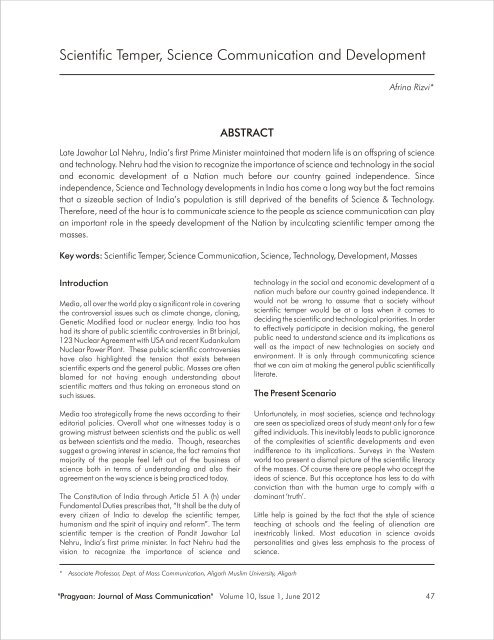Research Papers/Articles - Institute of Management Studies Dehradun
Research Papers/Articles - Institute of Management Studies Dehradun
Research Papers/Articles - Institute of Management Studies Dehradun
Create successful ePaper yourself
Turn your PDF publications into a flip-book with our unique Google optimized e-Paper software.
Scientific Temper, Science Communication and Development<br />
ABSTRACT<br />
Late Jawahar Lal Nehru, India’s first Prime Minister maintained that modern life is an <strong>of</strong>fspring <strong>of</strong> science<br />
and technology. Nehru had the vision to recognize the importance <strong>of</strong> science and technology in the social<br />
and economic development <strong>of</strong> a Nation much before our country gained independence. Since<br />
independence, Science and Technology developments in India has come a long way but the fact remains<br />
that a sizeable section <strong>of</strong> India’s population is still deprived <strong>of</strong> the benefits <strong>of</strong> Science & Technology.<br />
Therefore, need <strong>of</strong> the hour is to communicate science to the people as science communication can play<br />
an important role in the speedy development <strong>of</strong> the Nation by inculcating scientific temper among the<br />
masses.<br />
Key words: Scientific Temper, Science Communication, Science, Technology, Development, Masses<br />
Introduction<br />
Media, all over the world play a significant role in covering<br />
the controversial issues such as climate change, cloning,<br />
Genetic Modified food or nuclear energy. India too has<br />
had its share <strong>of</strong> public scientific controversies in Bt brinjal,<br />
123 Nuclear Agreement with USA and recent Kudankulam<br />
Nuclear Power Plant. These public scientific controversies<br />
have also highlighted the tension that exists between<br />
scientific experts and the general public. Masses are <strong>of</strong>ten<br />
blamed for not having enough understanding about<br />
scientific matters and thus taking an erroneous stand on<br />
such issues.<br />
Media too strategically frame the news according to their<br />
editorial policies. Overall what one witnesses today is a<br />
growing mistrust between scientists and the public as well<br />
as between scientists and the media. Though, researches<br />
suggest a growing interest in science, the fact remains that<br />
majority <strong>of</strong> the people feel left out <strong>of</strong> the business <strong>of</strong><br />
science both in terms <strong>of</strong> understanding and also their<br />
agreement on the way science is being practiced today.<br />
The Constitution <strong>of</strong> India through Article 51 A (h) under<br />
Fundamental Duties prescribes that, “It shall be the duty <strong>of</strong><br />
every citizen <strong>of</strong> India to develop the scientific temper,<br />
humanism and the spirit <strong>of</strong> inquiry and reform”. The term<br />
scientific temper is the creation <strong>of</strong> Pandit Jawahar Lal<br />
Nehru, India’s first prime minister. In fact Nehru had the<br />
vision to recognize the importance <strong>of</strong> science and<br />
technology in the social and economic development <strong>of</strong> a<br />
nation much before our country gained independence. It<br />
would not be wrong to assume that a society without<br />
scientific temper would be at a loss when it comes to<br />
deciding the scientific and technological priorities. In order<br />
to effectively participate in decision making, the general<br />
public need to understand science and its implications as<br />
well as the impact <strong>of</strong> new technologies on society and<br />
environment. It is only through communicating science<br />
that we can aim at making the general public scientifically<br />
literate.<br />
The Present Scenario<br />
* Associate Pr<strong>of</strong>essor, Dept. <strong>of</strong> Mass Communication, Aligarh Muslim University, Aligarh<br />
Afrina Rizvi*<br />
Unfortunately, in most societies, science and technology<br />
are seen as specialized areas <strong>of</strong> study meant only for a few<br />
gifted individuals. This inevitably leads to public ignorance<br />
<strong>of</strong> the complexities <strong>of</strong> scientific developments and even<br />
indifference to its implications. Surveys in the Western<br />
world too present a dismal picture <strong>of</strong> the scientific literacy<br />
<strong>of</strong> the masses. Of course there are people who accept the<br />
ideas <strong>of</strong> science. But this acceptance has less to do with<br />
conviction than with the human urge to comply with a<br />
dominant ‘truth’.<br />
Little help is gained by the fact that the style <strong>of</strong> science<br />
teaching at schools and the feeling <strong>of</strong> alienation are<br />
inextricably linked. Most education in science avoids<br />
personalities and gives less emphasis to the process <strong>of</strong><br />
science.<br />
"Pragyaan: Journal <strong>of</strong> Mass Communication" Volume 10, Issue 1, June 2012 47


